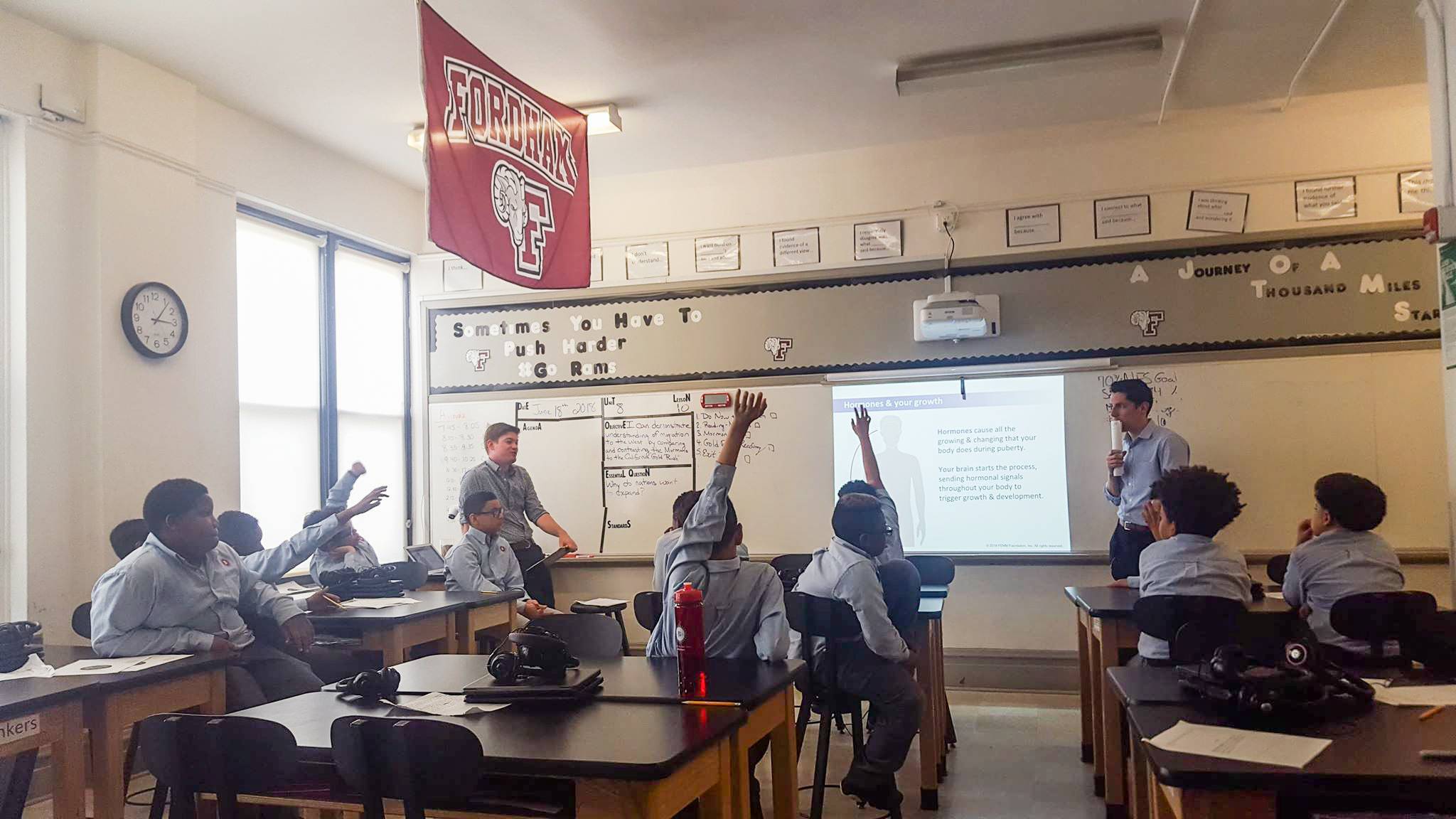It is undeniable that today’s society is over-sexualized; one just needs to take a walk through the city, turn on the TV, navigate the Internet or simply listen to a normal conversation between teenagers. I wouldn’t like to generalize, but I believe that this over-sexualization is a real issue, and we should learn how to approach it and understand the proper place of sexuality in a healthy human life. If we fail to do that, it becomes a lot easier to lose sight of the dignity of the human person and the importance of self-gift attached to the sexual union. That’s why I think that kids should learn how their reproductive system works, the impact that those changes will have in its emotions and physical constitution, as well as some practical guidelines on how to lead a healthy lifestyle.

I first experienced teenMEN in action through my visit in Brilla, a school in the South Bronx. I went there with other World Youth Alliance staff in order to evaluate how this program was being implemented in a fifth-grade class. The content of teenMEN addresses everything that a young man needs to know in relation to his health and reproductive system, and does this in a way that respects the dignity of the person and different cultures. It is vital for a teenager to understand what he is going through, and the challenges that he might have to face. Disinformation on this topic won’t benefit the kids, nor will misinformation. Kids will eventually acquire that knowledge, but the way they will do so will probably be harmful if it doesn’t come from a person who has some expertise and care for that child’s well-being. Parents (who tend to care for their kids) often lack the tools and the technical information to teach the kids on these issues; they might be able to inculcate a moral education, but they won’t know how to address the physical and emotional processes. Here is where teenMEN comes in: it equips those boys with the necessary tools to live a healthy adolescence and life in general, by learning about their reproductive system, hormones (particularly testosterone), a healthy body, the impact of hormones on physical and emotional changes, and the importance of nutrition, exercise, sleep and hygiene habits. The program is culturally respectful, as it doesn’t impose any practice in particular. Its purpose is to inform (not to morally evaluate or dictate), allowing the students to make informed choices.
When I was a kid, I attended a similar program in Spain. This is a program for affective and sexual education for teens and young adults, which helps people answer many questions on friendship, love, fecundity and sexuality. I felt that the training received at that age was super helpful, as this was something not taught at schools. What kids know about sexuality and reproductive systems comes mostly from two sources: either they learn it in this type of trainings (which are very uncommon) or the kids discover it on their own in a hostile environment (be it the Internet, or in conversations with other kids that have been over-exposed to sexual issues).
In the hypothetical situation in which I had never received a similar formation to teenMEN, I can say that I would have seen myself totally lost.
At home, no one ever really explained to me how do the masculine and feminine reproductive system work, or what emotional and physical changes I would be undergoing. I believe that this situation is extremely common among young boys that are entering adolescence, but no one really externalizes it, and it seems there is a fear of asking questions, as this is interpreted as a sign of inexperience and naiveté.
Going back to Brilla, the school in which teenMEN is being implemented: I was impressed to see fifth-graders talking about hormones, and how they originate in the brain and travel through the blood as if they were text messages directed to different parts of the body. Those kids were really open when talking about emotions, anger, love, anxiety…some of them even shared personal experiences in front of everyone!
After the teenMEN session I had the chance to see an interview with two kids.
One of them said, “TeenMEN has been very informational and helpful for me, as those topics are usually hard to speak about.”
The second student gratefully explained that “before puberty, very few people have the chance to learn about the reproductive system and how its health affects the whole body. Now I won’t be surprised!” When they were asked if they would share it with other kids, they answered: “Definitely! We all are going through the same (thing), so this program helps us understand our friends and to put myself in their shoes. Also, the daily schedule will help us grow healthy!”
My final impression on teenMEN is that the students really understood all the concepts that this program wanted to transmit. I hope that they will remember it throughout puberty, and that they share with their friends and family this new acquired knowledge.
[su_divider top=”no” size=”1″]
Written by Albert Vidal, a WYA Headquarters intern from Spain.







